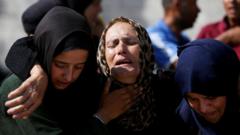Iran's nuclear program comes under scrutiny as IAEA inspectors leave, raising fears of covert weapons development.
**Inspectors Exit Iran as Tensions Escalate Amid Nuclear Concerns**

**Inspectors Exit Iran as Tensions Escalate Amid Nuclear Concerns**
International Atomic Energy Agency halts oversight as Iran suspends cooperation in the wake of conflict with Israel.
The United Nations’ nuclear watchdog, the International Atomic Energy Agency (IAEA), announced on Friday that its team of inspectors has departed from Iran, marking a significant turn in the nation’s contentious relationship with international nuclear oversight. This development follows Iran's abrupt suspension of cooperation amid ongoing hostilities with Israel that have exacerbated concerns over the country’s nuclear ambitions.
As tensions mounted after Israel launched airstrikes targeting Iranian military and nuclear facilities, Iran’s president enacted legislation that effectively blocks international inspections. The suspension of IAEA operations comes at a precarious time when experts warn that the war may push Iran to further conceal its nuclear activities, complicating any efforts to monitor compliance with nonproliferation agreements.
In a statement issued through social media platform X, the IAEA confirmed that its inspectors had left Iran after a period of scrutiny during the conflict. The agency's relationship with Iran has been under strain since it recently reported that Tehran was not adhering to its nuclear nonproliferation obligations. Iranian officials have criticized this assessment, arguing that it provided Israel with a pretext for its military actions.
Although it remains uncertain how the recent hostilities have impacted Iran’s nuclear program, U.S. officials, including President Trump, claimed that strikes targeted three key nuclear sites and significantly damaged the program. In contrast, Rafael Grossi, the IAEA's director general, emphasized that Iran's stockpile of highly enriched uranium—capable of developing nuclear weapons—has not been accounted for, suggesting that the program may only be delayed rather than destroyed.
While Iran maintains that its nuclear initiatives are peaceful, the IAEA disclosed that the nation has amassed approximately 882 pounds of highly enriched uranium, a stockpile sizable enough to constitute the beginnings of atomic weapon production. Following the IAEA’s warnings and Israeli military actions, Iranian lawmakers have laid out two preconditions for resuming cooperation: ensuring the safety of its nuclear operations and gaining recognition of its right under international law to enrich uranium.
Amid escalating rhetoric, Iran’s deputy foreign minister has indicated a readiness to engage in diplomatic dialogue with the United States, affirming a commitment to discussions. "We are for diplomacy," he remarked during an interview with NBC News on Thursday, signaling a potential avenue for de-escalation as the international community watches closely.
The IAEA continues to stress the urgency of establishing a framework for renewed monitoring and verification activities in Iran, as global concerns over nuclear proliferation loom large.
As tensions mounted after Israel launched airstrikes targeting Iranian military and nuclear facilities, Iran’s president enacted legislation that effectively blocks international inspections. The suspension of IAEA operations comes at a precarious time when experts warn that the war may push Iran to further conceal its nuclear activities, complicating any efforts to monitor compliance with nonproliferation agreements.
In a statement issued through social media platform X, the IAEA confirmed that its inspectors had left Iran after a period of scrutiny during the conflict. The agency's relationship with Iran has been under strain since it recently reported that Tehran was not adhering to its nuclear nonproliferation obligations. Iranian officials have criticized this assessment, arguing that it provided Israel with a pretext for its military actions.
Although it remains uncertain how the recent hostilities have impacted Iran’s nuclear program, U.S. officials, including President Trump, claimed that strikes targeted three key nuclear sites and significantly damaged the program. In contrast, Rafael Grossi, the IAEA's director general, emphasized that Iran's stockpile of highly enriched uranium—capable of developing nuclear weapons—has not been accounted for, suggesting that the program may only be delayed rather than destroyed.
While Iran maintains that its nuclear initiatives are peaceful, the IAEA disclosed that the nation has amassed approximately 882 pounds of highly enriched uranium, a stockpile sizable enough to constitute the beginnings of atomic weapon production. Following the IAEA’s warnings and Israeli military actions, Iranian lawmakers have laid out two preconditions for resuming cooperation: ensuring the safety of its nuclear operations and gaining recognition of its right under international law to enrich uranium.
Amid escalating rhetoric, Iran’s deputy foreign minister has indicated a readiness to engage in diplomatic dialogue with the United States, affirming a commitment to discussions. "We are for diplomacy," he remarked during an interview with NBC News on Thursday, signaling a potential avenue for de-escalation as the international community watches closely.
The IAEA continues to stress the urgency of establishing a framework for renewed monitoring and verification activities in Iran, as global concerns over nuclear proliferation loom large.






















